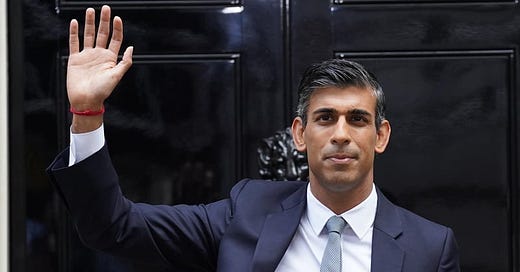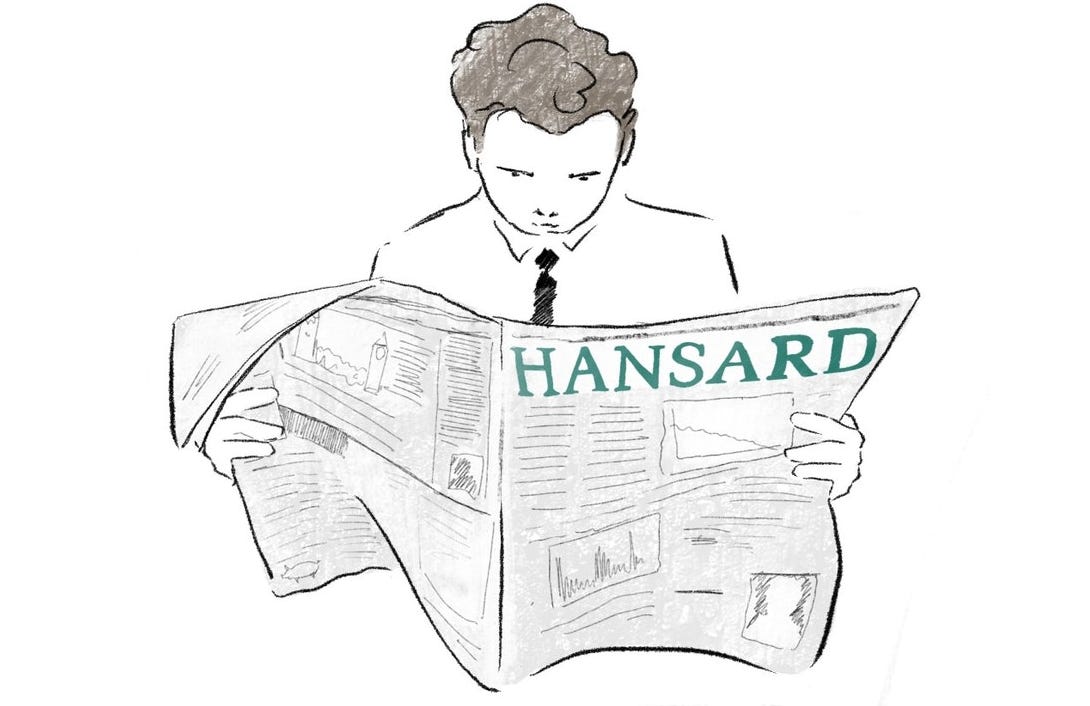New Prime Minister, 'police bases', Chinese statement on Manchester
A Beijing to Britain briefing
Hello,
The first week of Rishi Sunak’s premiership comes to a close. While most of Government and Whitehall’s machinery is focusing on the immediate economic situation, some in Westminster are wondering what elements of his predecessor’s China approach the Prime Minister will retain. Will Downing Street continue with its plan to label China an “official threat”? Will the Government ban Confucius Institutes? Will the Prime Minister push for a technology NATO?
Unlike Truss, Sunak did not make hawkishness towards China a prevailing part of his leadership narrative until he was forced to. His declaration that China is the “largest threat to Britain and the world’s security and prosperity this century” during the summer was viewed by most as campaign rhetoric - everything up to that point suggests Sunak is an economic pragmatist who believes that the debate around China lacks “nuance”.
Three domestic issues will give us some steer as to how Prime Minister Sunak plans to handle the relationship. The first is whether or not he expels the Chinese staff involved in the incident in Manchester a fortnight ago - a decision kindly left to him by his predecessor. The second is how he deals with growing political anger over the revelation that China has a number of unofficial police stations dotted throughout the United Kingdom. And the third is how he deals with any potential fallout from the Foreign Affairs Committee’s visit to Taiwan. Should the Chinese Government respond to any of these by escalating the situation, Sunak’s latitude (and Parliament’s diminished appetite) for pragmatism will be depleted.
On the international stage, Global Britain under a new Prime Minister may take a slightly altered direction. The Biden Administration this week published the 2022 National Defense Strategy, which is self-described as “a call to action for the defense enterprise to incorporate Allies and partners at every stage of defense planning”: how far will Sunak align with its recommendations, and America’s hardening approach to China more generally? What does Britain get in return? A Free Trade Agreement is still some distance away. Conversely, as you read this briefing note, the United Kingdom’s Foreign Secretary is in India, attempting to smooth over recent turbulence while both countries negotiate an FTA. The tectonic plates on the global stage are ever-shifting.
Order! Order!
Some of the more eye-catching questions and tweets from Westminster dwellers this week
Baroness Cox asked “His Majesty's Government what plans they have, if any, to publish a list of English hospitals and medical schools that have partnered in any capacity with organisations and institutions in China involved in organ transplantation.”
Politics
One week in
What’s on the agenda
The United Kingdom has a new Prime Minister: Rishi Sunak is the first Asian Prime Minister and the youngest in two centuries. The former hedge fund manager arrives to a difficult in-tray of decisions - the majority of which concern tough economic calls. However, foreign policy is on his agenda, primarily because of Ukraine, but also in relation to China. Sunak will face domestic and international pressure: from his own party and the Western bloc - not to be seen as rolling back on hardening the UK’s political relationship with Beijing, and from China - not to be seen as pursuing a hawkish campaign against them.
During his summer campaign, readers may remember that Sunak labelled China the “largest threat to Britain and the world’s security and prosperity this century.” When asked by Bloomberg what the Chinese Government thought of Sunak’s arrival, a Foreign Ministry spokesperson said “China's position on developing its relations with the UK is consistent and clear. Cultivating and advancing sound bilateral ties is the shared responsibility of China and the UK. It serves the common interests of both our peoples. China hopes to advance ties with the UK along the right track on the basis of mutual respect and mutual benefit.”
Note that in his first call to President Biden, the pair “discussed the extent of UK-US cooperation, both bilaterally and in regions such as the Indo-Pacific where the AUKUS pact forms part of our efforts to enhance stability and counter China’s malign influence.” Interestingly, the term “malign influence” is not present in the Whitehouse readout of the call. The Chinese Embassy in the UK responded in a statement, saying “China is a development partner and opportunity for other countries, not a threat or challenge to anyone. Facts have fully proven that China’s development is aimed at making lives better for the Chinese people. It will only contribute positively to world peace and stability. We urge the UK to have a correct understanding of China, embrace the trend of the time, and do more to contribute to the healthy and steady development of China-UK relations and peace and prosperity of the world.”
Also mentioned in both readouts is the upcoming G20 Summit in Indonesia. As we pointed out back in late summer, this will see a number of world leaders in the same room for the first time in years - including potentially President Biden, Prime Minister Sunak and General Secretary Xi Jinping. India will become the G20 Chair at the meeting - and on that front, Foreign Secretary James Cleverly visited the country as the week closed. His charm offensive will see him speaking at the Special Meeting of the UN Security Council Counter-Terrorism Committee and meeting India’s Minister of External Affairs Dr Jaishankar to discuss the latest on the 2030 Roadmap, “the landmark commitment to boost cooperation between the UK and India over the next decade under a Comprehensive Strategic Partnership.” Cleverly said “Our relationship with India is hugely important to me; as the world’s largest democracy, India is a natural partner for the UK in the Indo-Pacific. It is an economic and tech powerhouse. Our deeper ties will boost both our economies and help to tackle global security challenges.”
Closer to home, Sunak’s approach to China will draw Parliamentary scrutiny. Although two of the chief China hawks remain in Ministerial positions (China Research Group’s Tom Tugendhat as Security Minister, and IPAC’s Nusrat Ghani as a Business Minister), their number is swelling on the backbench. Unlike his predecessor Liz Truss, Sunak is not a China hawk - despite his outlandish pledges during his summer campaign - and few believe they are cut from the same cloth in this respect. Per state media outlet The Global Times, “Chinese experts predict that as Sunak is embattled with economic gloom at home, it is impossible for him to present a complete China policy in at least half a year, nor will he continue his predecessor Liz Truss' hard line approach, such as the attempt to label China as a "threat," since further frayed Beijing-London tie will only add fuel to the fire to current plight the UK is facing.”
This caucus (not necessarily united in their views beyond being sceptical of China) will be watching closely for any signs that Sunak is backtracking on his hawkish rhetoric - which included a promise to shut down Confucius Institutes (CI) throughout the UK. On that point - The Telegraph ran a story this week claiming the Government was continuing a Truss-era effort to begin a consultation on banning CI. Until anything concrete emerges, it’s best to treat these sorts of ‘exclusives’ with heavy scepticism.
Regardless, there are a number of tricky decisions that will need Sunak's (and his Foreign Secretary James Cleverly’s) immediate attention. Last week, the Government promised an update on the Manchester Chinese Consul-General situation - that didn’t happen. And in a matter of weeks, the Foreign Affairs Committee (led by the sanctioned CRG’s Alicia Kearns) will visit Taiwan. Finally, the Prime Minister has to decide if he will carry on his predecessor’s campaign of relabeling China as an “official threat” in the Integrated Review. Any overblown domestic or Chinese reaction to these episodes could add significant strain to the overall relationship.






